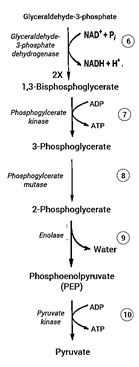Consider the steps of glycolysis given in the diagram:

It is advantageous that in reaction 5 DHAP is isomerized to G3P because:
1. G3P has more energy than DHAP
2. DHAP is highly toxic
3. Regulation of the pathway becomes easy
4. DHAP is unstable and breaks down to Acetyl CoA

1. G3P has more energy than DHAP
2. DHAP is highly toxic
3. Regulation of the pathway becomes easy
4. DHAP is unstable and breaks down to Acetyl CoA
What percentage of ATP formed in a glycolytic pathway is formed by substrate-level phosphorylation?
| 1. | 0% | 2. | 3.5% |
| 3. | 32% | 4. | 100% |
By the end of glycolysis, most of the original energy in the glucose molecule is:
1. utilized to form ATP.
2. retained in the pyruvate.
3. stored in the NADH produced.
4. lost as heat.
Krebs cycle is also called as:
| 1. | glycolysis | 2. | fermentation |
| 3. | Calvin cycle | 4. | the citric acid cycle |

To unlock all the explanations of 38 chapters you need to be enrolled in MasterClass Course.

To unlock all the explanations of 38 chapters you need to be enrolled in MasterClass Course.
Only two molecules of NADH are formed during glycolysis because:
| 1. | The amount of energy in glucose is sufficient only to make two NADH. |
| 2. | Most of the energy of glucose is diverted to ATP during Glycolysis. |
| 3. | Most of the free energy available from the oxidation of glucose remains in pyruvate. |
| 4. | The availability of NAD+ is enough to make only two NADH. |
The ʺnetʺ products of glycolysis are:
1. , , 2 pyruvate, 2 ATP, and .
2. , , 2 ATP, and 2 pyruvate
3. , 2 pyruvate, 4 ATP, and .
4.2 NADH, , 2 pyruvate, 2 ATP, and .
Glycolysis will be most adversely affected by a toxin:
| 1. | that reacts with oxygen and reduces its availability |
| 2. | that binds to pyruvate and inactivates it |
| 3. | that closely mimics the structure of glucose but is not metabolized |
| 4. | that regenerates from NADH |
Consider the latter half of glycolytic pathway given below:

In reaction 6
I. The enzyme involved is an oxidoreductase
II. Arsenate may uncouple the pathway at this stage
1. Only I is true
2. Only II is true
3. Both I and II are true
4. Both I and II are false
Consider the latter half of glycolytic pathway given below:
Regarding reaction 7:
I. Glycolysis has reached the break-even point.
II. When the cell has plenty of ATP (and little ADP), this reaction does not occur.
1. Only I is true
2. Only II is true
3. Both I and II are true
4. Both I and II are false
Refer to the schematic diagram of Krebs citric acid cycle given below:
How many of the enzymes involved in the pathway are dehydrogenases?
1. 2
2. 3
3. 4
4. 5


